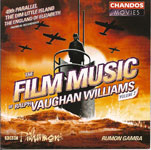Although written for different types of propaganda films, each of these three Vaughan Williams scores retains high artistry and a sense of elevated purpose. In 1941’s 49th Parallel (called The Invaders in the U.S.) the producers’ avowed purpose was to help convince the Americans to join Britain in the war against Hitler’s Germany. A German U-Boat is disabled somewhere on the north coast of Canada. A few members of its crew must elude an increasingly tight manhunt and make it to the relative safety of a neutral United States, across the 49th parallel. As they travel through Canada, their encounters also serve the purpose of illustrating the superiority of Democracy as the system for which Britain and (hopefully) the Americans will fight, while also showing the British audience the diversity and resources of the Canadian ally it already had. The Age of Elizabeth (1957) was a documentary glorifying England’s history by illustrating life during the reign of the Tudor monarch; The Dim Little Island (1949) was a morale-boosting attempt to counter the jibe that Britain was a “dim” and “unmusical” place with its best days behind it.
As recorded here, The Dim Little Island comprises a short bit of original music plus an intriguing reworking of the composer’s 1939 work for string orchestra and harp, Five Variants of “Dives and Lazarus”. The original version is better, but this is pleasant listening. The other two scores, heard in substantially complete versions, are nearly symphonic in scope if not in structure. They intriguingly reflect the “serious” music Vaughan Williams was writing at the time: pre-echoes of the Fifth and Sixth Symphonies abound in 49th Parallel; hints of the last three symphonies are evident in Elizabeth. The music of the former suffers a bit by being diffuse in structure. Echoing the near-travelogue nature of the long chase, the score mainly strings together tunes of the cultures the German officers encounter.
The Tudor-era documentary has long been represented by the suite The England of Elizabeth, drawn by Muir Matheson. Nevertheless, this 24-minute selection is a revelation. The composer tapped his lifetime of experience with English folk and hymn music, and then applied his propensity to use shimmering bell textures in unexpected ways. Good as 49th Parallel is, it is this suite that makes the disc indispensable to all who are susceptible to Vaughan Williams’ charms–that and the outstanding sympathy and fine playing of the BBC Philharmonic and Rumon Gamba, here continuing their major film music series, joined expertly by the choir at appropriate moments in Elizabeth. The tenor and soprano soloists acquit themselves well in brief appearances in the two longer suites. Chandos’ sound has its usual clarity and, with a warm sound-stage, escapes the label’s occasional tendency to hardness. [11/16/2007]
































